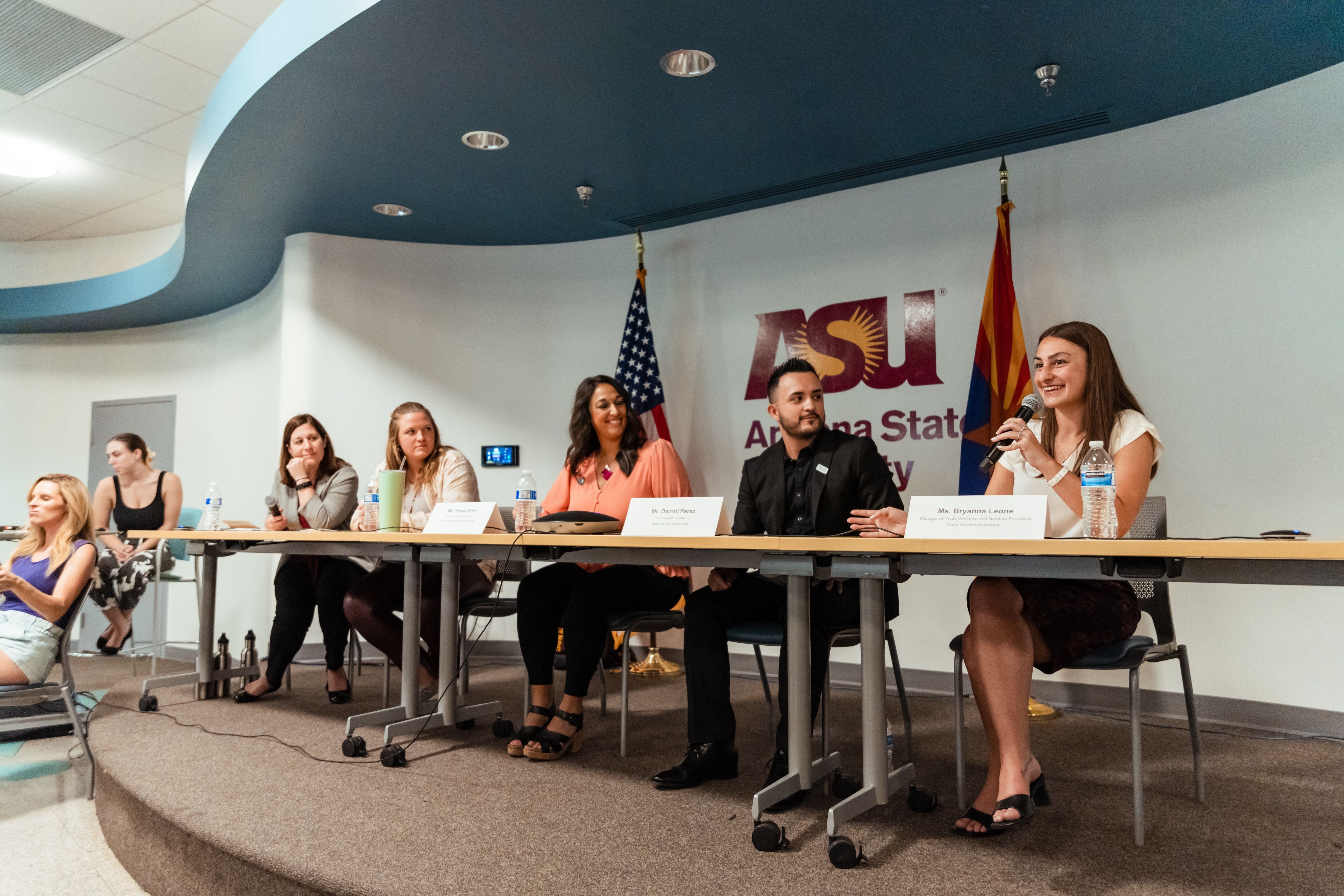Planners give ASU students insight into what it takes to stage a Super Bowl

Students enjoy a visit from Spike, the Arizona Super Bowl Host Committee mascot, while attending a recent panel discussion of event planners involved with staging Super Bowl LVII next February in Glendale. Photo courtesy Erin Schneiderman
The National Football League’s season is barely underway, but fans in Arizona already are looking forward to the end, when Super Bowl LVII will be played in Glendale in early February.
About 100 ASU students studying a variety of disciplines — including tourism development, nonprofit leadership, sports business and special event management — recently learned about the multitude of community connections behind the championship game during an event hosted by the School of Community Resources and Development, part of the Watts College of Public Service and Community Solutions at Arizona State University.
There, a panel of experts, community leaders and bowl organizers broke down the process for hosting the big game, detailing the bowl’s economic impact, community programming, sponsorship and, most importantly for the students, how they can get involved in the action.
“It’s not every year that our students get to experience a Super Bowl in Arizona,” said event organizer Erin Schneiderman, a clinical assistant professor in the School of Community Resources and Development. “My hope is to expose any student who wants to be involved in the plethora of opportunities that exist surrounding the big game and ancillary events.”
Schneiderman worked on the Arizona Super Bowl Host Committee when the 2008 game was played in the Valley.
Dozens of related events will take place surrounding the game, each of which will involve some degree of community participation, said Jennie Patel, head of social responsibility and volunteers for the current host committee. In addition to youth football clinics, water drives and a legacy grant program, Patel cited the bowl’s business connect program, where more than 200 small businesses and minority-, women-, LGBTQ- and veteran-owned organizations are participating.
ASU alum Darrell Perez, owner and founder of Xperience Entertainment, talked about being a member of the business connect program and opportunities that his company will look forward to as a result.
“The business connect program is designed to not only benefit companies during the Super Bowl, but set them up for success after,” Patel said.
Another ASU alum, Bryanna Leone from the Dairy Council of Arizona, discussed her organization’s partnership role in hosting two related events: the 2023 Taste of the NFL and Mission 57: End Student Hunger. Leone offered sponsorship dos and don’ts, and gave students a glimpse of what is involved with partnering with the NFL and host committee.
The discussion concluded with Patel walking students through the volunteer registration process and a meet-and-greet with Super Bowl LVII’s beloved mascot, Spike.

A panel of event planners and experts share what it takes to stage Super Bowl LVII, to be played in February in Glendale, with ASU students at a recent gathering at the Westward Ho on the Downtown Phoenix campus. Photo courtesy Erin Schneiderman
Working behind the scenes of major sporting events is nothing new to ASU students. This semester, a group of 75 undergraduates are working at State Farm Stadium in a rotational class offered by the Arizona Cardinals and the School of Community Resources and Development’s special events management program.
Students who attended the panel discussion said they learned the impact hosting a Super Bowl can have on a local area’s economy, how much work goes into an event of its size and how they are looking forward to being part of staging it.
“I was amazed to learn about the economic impact the Super Bowl has on Arizona and the Phoenix area,” said Emily Duralia, a junior communications major who is minoring in special events management. “Since water is becoming such a scarce resource, it will be interesting to see what goes into effect for water conservation education when we welcome our guests. I think I will be involved by working at State Farm Stadium, and the electric environment gets me pumped to be a part (of the event).”
Hunter Conedera, a junior tourism development and management major specializing in meetings and events, was impressed by the amount of money the committee needs to raise.
“I believe it was $50 million, which they said was doubled from the 2015 Arizona Super Bowl.” Conedera said.
Heath Perry, a sophomore materials science and engineering major, was surprised at how early preparations start.
“It’s crazy that shortly after the last Super Bowl that was hosted here in 2015, they were already doing research and planning for this one,” Perry said. “It goes to show how enormous of an event the Super Bowl really is to have to plan it so far in advance.”
“I would like to be in the middle of it all and help in any capacity I can,” said Danny Quinonez, a senior marketing major. “I would really like to be an airport greeter and help out-of-state visitors navigate our location. I think I'd meet some really interesting people in the process, and I'd love the chance to promote our state.”
Plenty of opportunities to get involved exist for students not enrolled in the Arizona Cardinals-sponsored class. Contact Schneiderman at erin.schneiderman@asu.edu to learn about options surrounding the game, auxiliary events and hospitality. There is already a waitlist for volunteering, but faculty, staff and students interested in joining the ASU delegation of Super Bowl volunteers can sign up here to be a part of the team.